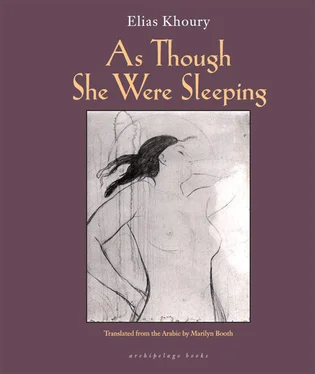. .
No, we need a little time, two years I think — what do you say to that?
. .
All right, then, give me nine months. Let’s figure that the house won’t take any more time than the baby. And anyway, don’t worry, we’ll have our own life, and we’ll have no one telling us what to do. Look, in the beginning anyway you’ll have your hands full with the child. My mother and Asma will do the cooking and housework and you’ll be living like a queen. And then we’ll go to our own house. See, houses are a bit difficult in Jaffa. It’s a big city, like Beirut, and it isn’t easy to find a decent house. I mean, it takes a little patience, and then it will all be fine.
Ever since she had met the Lebanese monk everything had changed. Before, when irritation had gotten the better of her voice, she would hear her mother’s voice issuing from her throat and she couldn’t stand it. It was the voice of a young girl who had suddenly found herself responsible for an entire family made up of four men and a nun in lay clothing: their invalid mother, whom everyone was obliged to make their chief concern every moment of the day. When Milia snapped at her oldest brother, Salim, saying that she was not a servant and heard her mother’s voice coming out of her mouth, the words got caught at the back of her throat and threatened to choke her. Milia did not remember exactly what had happened that day. She did not even remember the cause of the argument with her brother or what precisely she was saying when she choked on her own voice and no longer could speak. Then and there she had decided — in her own mind — that never again would she imitate her mother’s voice or gestures. She truly did calm down and become more accepting. But when she had first come to live in Nazareth she began to listen to her mother’s voice as it welled up from her memory. The memory of voices, she thought, was very frightening. In dreams you do not listen to the voice of the speaker. Words come without a voice; this is the secret of dreams, their bewitching nature. But when the voice of someone far away or dead erupts from your memory, and you listen to it with your own ears, it is bewildering and disorienting. Milia’s bafflement as she spoke to her mother and listened to her mother’s answers had congealed into fear.
Now this woman who embodied absence for her only daughter — and the awful sense of being left an orphan — revealed a presence that was wholly unexpected. In Nazareth her mother’s appearance did not create self-loathing. Milia found that even the absent mother was a linguistic necessity. You scream Mama! not because you are thinking of the woman who gave you life but because your lips need the sound of it, the letters blending warmly into each other. Milia, who in her moment of most intense pain in the Italian Hospital in Nazareth would scream out this magic word, before Mansour would hear the crying of the infant emerging from his mother’s body, did not then see her mother or feel her presence. What she saw was a world of white so total and profound that it had to be the brilliance of light.
Milia sensed how Mansour’s voice had lost itself inside the voice of his mother. She told him as much. He shrugged it off, saying he had been this way all his life, but he did begin attending more closely to his own gestures and avoided imitating his mother’s. He stopped yawning loudly with his mouth open, as his mother did with her repeated Ya Allahs .
But he did not notice his wife’s loss of voice, obscured by the Lebanese monk’s way of speaking. Now, whenever she spoke, she felt as though her voice was clothed in that of the strange man whom Mansour had tried to convince her did not exist except in her own mind.
On that day, when Milia had returned home exhausted, the pains of childbirth outlined on her face, Mansour sat alone in the large room with a handful of roasted chickpeas in front of him.
You must be hungry, she said, and hurried into the kitchen.
No, I’m not hungry. Come here and sit down next to me, let’s talk. That’s what I want.
She sat down beside him and he began talking — and relating the story of Tanyous the monk. He said he wanted to apologize to her, but at the same time he remained astounded that she had met the monk in the flesh. Apparently the man had been thrown out of the Franciscan monastery twenty years before and he lived in open country on his own. From time to time he was spotted in Marj Abu Amer. Only very rarely did he come to Nazareth, intending to pray in a grotto where he believed the holy family had lived. Whenever the monks saw him they chased him away with a shower of stones.
He had been afraid for her, he said, and had gone to the monastery in search of her. He knocked and knocked on the door before it was opened by an elderly monk who spoke Arabic with difficulty.
I asked him about you, explained Mansour. He was shocked, and said, Women do not come in here. He wanted to shut the door in my face but I begged him to listen to me. I asked him about the Lebanese monk; he was very reluctant to answer me. He crossed himself several times and asked if I was a relative, so I lied and said yes. He said he had thought so, from my Lebanese accent. I don’t know how he could have thought I speak like a Lebanese! It must be your influence, Mistress Milia. So now you can’t tell me anymore that I sound like my mother! Was he right, do I speak Lebanese?
How would I know!
And you sound more like a Palestinian now, anyway. We speak the same way. Then the man told me the whole story. This monk was thrown out of the monastery because he claimed he had found a gospel written by a disciple of Yusuf the Carpenter. And that this gospel written in Syriac tells the story of the Messiah differently than the four Greek gospels do. Supposedly it claims that Yusuf rejected the idea of the Messiah’s crucifixion, and wanted to do what Ibrahim did when God asked him to offer his only son as a sacrifice. It contains all sorts of heretical ideas, and if these were true, they would put Yusuf the Carpenter on the same footing as the Prophet Ilyas. The old monk called Tanyous a madman invaded by devils. That’s why they threw him out. He went back to his hometown in Lebanon. It’s said that he tried to preach his views in the holy valley where the Maronite monks live. He believed the Maronites have remained loyal to the faith’s covenant and its earliest days, because they use Syriac in their prayers and that is what the Messiah spoke. But it did not work: the monks in the Wadi Qadisha mocked him and even tried to drag him to Wadi el-Majanin — valley of the insane — where they put him in irons and threw him into a windowless grotto without water or food. He claimed that God sent him food dispatched on a huge eagle whose wings were so enormous that they veiled the skies. And that God sent him an angel in the guise of a lion who undid his chains. But it’s all lies — the man is crazy. The abbot explained to us that this sort of madness is very common in these lands that gave birth to all of the prophets. As he put it, this patch of ground witnesses a continuing struggle between God and the forces of Satan that is difficult for human beings to withstand. It becomes confusing, and some are unable to distinguish between the voice of God and the Devil’s voice. That Lebanese monk was the victim of his own lack of judgment; he could not tell one voice from the other and so he became Satan’s plaything.
And you believed all of this about him?
That’s not so important. What does matter is that I’m convinced where it concerns you. At first, I thought this monk was one of your hallucinations. Perhaps not, but, dearest, you need not believe him. This fellow is a devil, not a saint as you’ve been thinking.
How do I know, one way or the other?
Читать дальше












